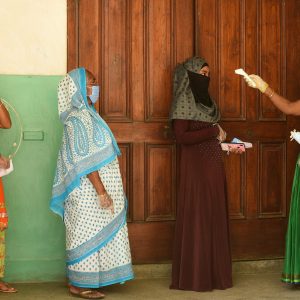Evictions in India an ominous message to Muslims
A violent eviction drive in Assam state highlights the ruling BJP’s explosive community politics, which attempt to disenfranchise and uproot the country’s Muslim minority.
Author:
12 October 2021

On 24 September, a graphic video from India’s northeastern state of Assam surfaced on social media, showing the local police shooting a lone protester at point-blank range. Moinul Haque, a 33-year-old farmer, was filmed rushing the police officers with a stick, seemingly in anguish after his home was razed during a forced-eviction drive led by the state government in the Sipajhar region.
In the video, the heavily armed police, who outnumber Haque, shoot and club him with batons rather than restrain him. A photographer accompanying the police can be seen stomping on Haque’s chest as he lay dead.
Haque was a father of three and the sole caretaker of his elderly parents. He was one of two people killed by the police on 23 September, when officers violently assaulted residents who were protesting against their eviction from the Dholpur villages. The other victim was 12-year-old Shakh Farid.

The Assam government, led by the Hindu nationalist Bharatiya Janata Party (BJP), said the expulsions in the Dholpur villages in Darrang district were to remove “illegal encroachers” and free 4 500 bighas (6km²) of state land. The authorities said about 1 200 families were evicted as part of a plan to start an “agricultural project” in the Garukhuti area. The region has been a site of conflict for decades, with some residents saying migrants usurped their land.
Nearly 5 000 people are now living in the open, most of them Bengali-speaking Muslims also known as Miya Muslims. They are largely peasants and daily-wage workers.
Undeterred by the furore over the killings, Assam chief minister Himanta Biswa Sarma said he was “happy” with how the authorities had emptied the land and razed four “illegal religious structures”, including two mosques and a madrassa. He justified the police shootings by saying thousands of people had attacked the officers. Moments before violence broke out on 23 September, Darrang police chief Sushanta Biswa Sarma – the chief minister’s brother – had threatened the protesters, saying the evictions would continue “even if the world were to turn upside down”.
Widespread outrage
While the Assam government cited the agricultural project, the government continued with its “illegal encroachers” rhetoric. But most of the uprooted people say they relocated to the area about 40 years ago after losing their homes to floods in other districts. Many claim to have bought their properties from locals at the time, although most land transactions took place without proper documentation and have minimal legal standing.
The violent police response to the protest sparked widespread outrage, with the Congress leader Rahul Gandhi describing it as “state-sponsored fire”. The leader of the main opposition Congress in Assam, Bhupen Kumar Borah, called it a “barbaric act” and said the eviction was “inhuman”. Ashraful Hussain, a member of the state assembly from the All India United Democratic Front, called the police brutality “fascist, communal and bigoted” in a tweet.
Ruling BJP party spokesperson Kamakhya Prasad Tasa said opposition parties were “politicising” the issue and that the government had given notice to the settlers to clear the land, but they refused to do so. But after the nationwide fury, the state government ordered a judicial inquiry into the circumstances that led to the police violence.
Related article:
The Assam chief minister visited the area in June and directed the district administration to clear the area for the government to start its community farming project. The state government began its eviction drives despite a Supreme Court of India order against the evictions because of the Covid-19 pandemic.
Anti-migrant sentiment propelled the BJP’s rise to power in the state in 2016, and the government soon began a series of eviction campaigns, notably in Sipajhar. The bulk of evictions have taken place in regions where Muslims of Bengali descent are in the majority. Darrang has experienced the most evictions despite neighbouring districts having a greater number of “illegal encroachments”, according to official records.
The BJP government’s anti-migrant campaign in Assam has not only shattered families but also led to hundreds confined in detention camps, with another 1.9 million people fearing a similar fate.
Communal campaign
Over the decades, Assam has become a site for the Sangh Parivar collection of right-wing Hindu nationalist parties, including the BJP, to amplify its campaign for exclusionary citizenship based on religion. The state has been riven by ethnic strife ever since migrants arrived to work on the sprawling British tea plantations. Long-simmering tensions between indigenous Assamese people and Muslim migrants have exploded into violence. Hundreds of people were killed by mobs intent on driving away Muslim migrants during the worst flare-up in 1983.
Fear over citizenship status has thus afflicted displaced Assamese people since particularly the 1980s, when the Assam Accord was implemented and the process of identifying “illegal immigrants” began. These worries were compounded when Assam’s National Register of Citizens (NRC), a list of people who can prove they were already living in the state by 24 March 1971, was completed.
Related article:
Assam is the only state in India to have a citizenship register. It was created in 1951 to determine who was born in the state and is therefore Indian, and who might be a migrant from what used to be East Pakistan, a territory that became Bangladesh in 1971.
The Indian government insists the effort is aimed at identifying and expelling “illegal immigrants”, but detractors say it is a “witch hunt” targeting Assam’s ethnic minority, especially Muslims.
The Indian Supreme Court ordered in 2013 that the NRC be updated and this process began in 2015. When the draft NRC in Assam was released in 2018, almost four million people had been excluded. Nearly 1.5 million of them were Hindus.
A pattern for ethnic fragmentation
The omission of a significant number of Hindus from the list became arguably the primary motivation for revisions to the citizenship law. So, when the Citizenship Amendment Act of 2019 was enacted, only Muslims would be excluded from seeking citizenship. The Assam NRC was updated in August 2019 and more than 1.9 million people were omitted and now face losing their citizenship, and possible deportation, exile and statelessness.
The 2019 Assam NRC list excluded 486 000 Bangla Muslims of a total of 700 000 excluded Muslims, 500 000 to 690 000 Bangla Hindus and 60 000 Assamese Hindus, according to Breaking Worlds: Religion, Law and Citizenship in Majoritarian India; The Story of Assam, a 2021 report by the Political Conflict, Gender and People’s Rights Initiative at the Center for Race and Gender at the University of California, Berkeley. However, Hindus excluded from the 2019 list are likely to be protected through the 2019 amendment to the Citizenship Act of 1955.
The report says those who have had to verify their right to live where they do have experienced increased mental and emotional distress. The prospect of detention in camps, deportation and statelessness has had a negative impact on the psychological and intergenerational health of individuals and communities. “This is instantiated through health crises, including sleep irregularities, post-traumatic stress disorder, suicidal ideation and suicide. Between July 2015 and October 2020, between 38 and 42 persons apparently committed suicide in Assam in connection with the revocation of their own or a relative’s citizenship rights,” it says.

What is happening in Assam provides a pattern for similar measures in other parts of India and foreshadows the violent disempowerment of Muslims as second-class citizens under the Narendra Modi government. The BJP’s anti-Muslim citizenship policies, which mirror Jim Crow’s system of mass disenfranchisement in the United States, point to the racial violence and community-based schism set to define India’s national politics. BJP leaders have repeatedly made assertions that a nationwide NRC exercise will be implemented before 2024.
“Assam is Modi’s grand laboratory, where he is putting Muslims to the litmus test of a citizen verification drive – separating the trueborn from the chaff – before taking it national,” says author Debasish Roy Chowdhury. The BJP claims that it merely wants India to be rid of “Bangladeshi migrants” but uses this as code for Indian Muslims, he adds.
“As Jews in Nazi Germany were called ‘rats’ and Tutsis in Rwanda in the 1990s were called ‘cockroaches’, so BJP members now refer to Indian Muslims as ‘termites’ eating away at India’s resources, denying Hindus what is due to them in their own land,” says Chowdhury.


